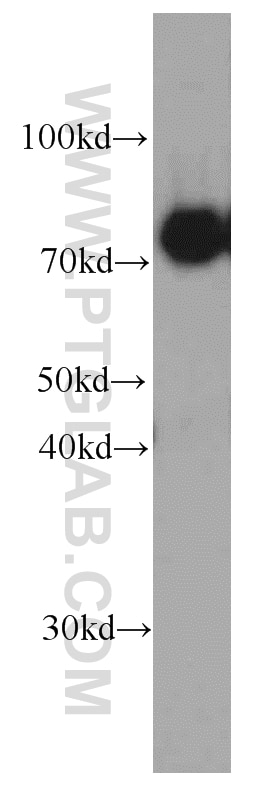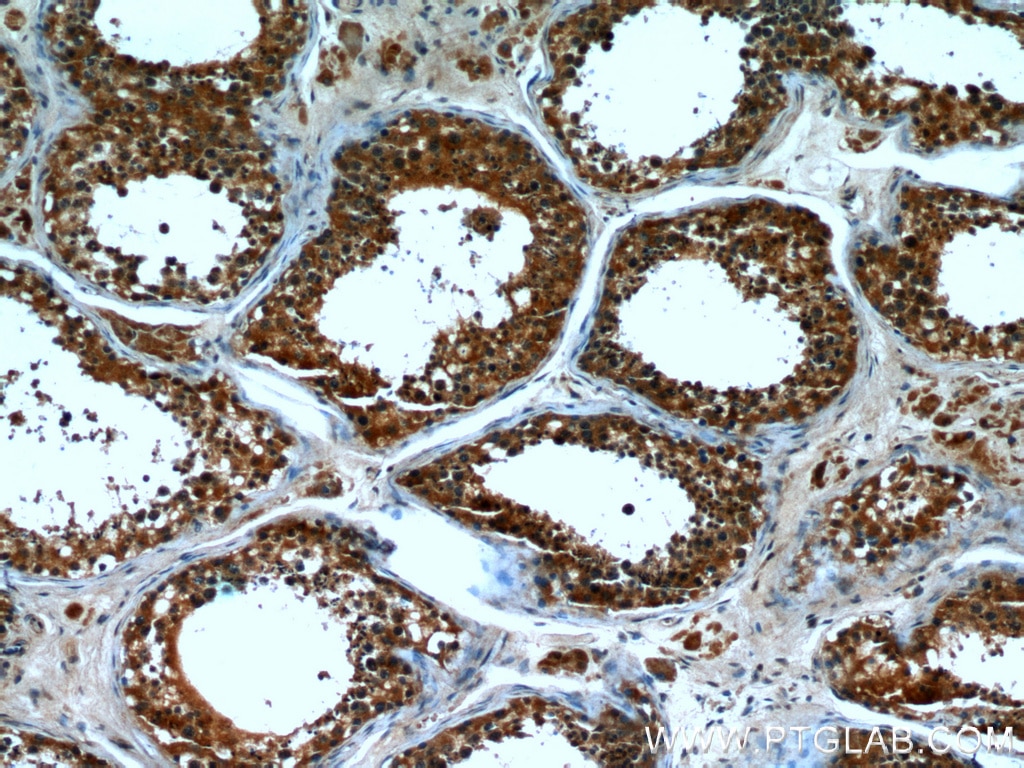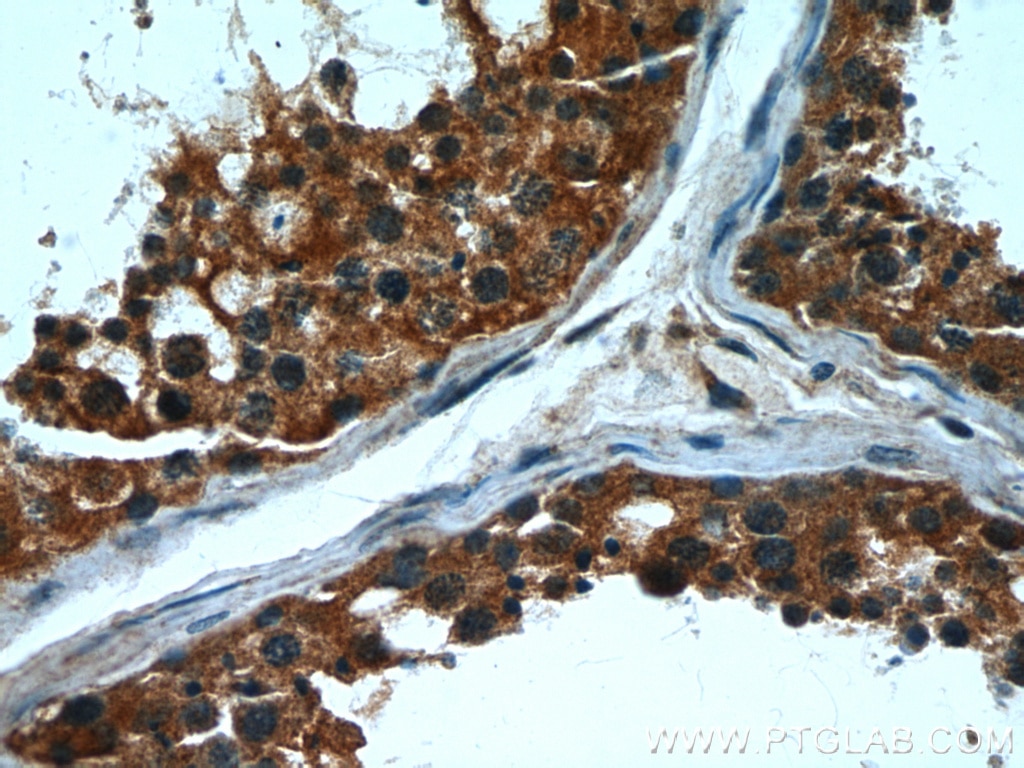- Phare
- Validé par KD/KO
Anticorps Monoclonal anti-CPT1C
CPT1C Monoclonal Antibody for IHC, WB, ELISA
Hôte / Isotype
Mouse / IgG2b
Réactivité testée
Humain, porc et plus (2)
Applications
WB, IHC, IF, ELISA
Conjugaison
Non conjugué
CloneNo.
5D11B5
N° de cat : 66072-1-Ig
Synonymes
Galerie de données de validation
Applications testées
| Résultats positifs en WB | cerveau humain, tissu cérébral humain |
| Résultats positifs en IHC | tissu testiculaire humain il est suggéré de démasquer l'antigène avec un tampon de TE buffer pH 9.0; (*) À défaut, 'le démasquage de l'antigène peut être 'effectué avec un tampon citrate pH 6,0. |
Dilution recommandée
| Application | Dilution |
|---|---|
| Western Blot (WB) | WB : 1:500-1:1000 |
| Immunohistochimie (IHC) | IHC : 1:20-1:200 |
| It is recommended that this reagent should be titrated in each testing system to obtain optimal results. | |
| Sample-dependent, check data in validation data gallery | |
Applications publiées
| KD/KO | See 3 publications below |
| WB | See 7 publications below |
| IF | See 1 publications below |
Informations sur le produit
66072-1-Ig cible CPT1C dans les applications de WB, IHC, IF, ELISA et montre une réactivité avec des échantillons Humain, porc
| Réactivité | Humain, porc |
| Réactivité citée | rat, Humain, porc, souris |
| Hôte / Isotype | Mouse / IgG2b |
| Clonalité | Monoclonal |
| Type | Anticorps |
| Immunogène | CPT1C Protéine recombinante Ag17963 |
| Nom complet | carnitine palmitoyltransferase 1C |
| Masse moléculaire calculée | 792 aa, 90 kDa |
| Poids moléculaire observé | 82 kDa |
| Numéro d’acquisition GenBank | BC029104 |
| Symbole du gène | CPT1C |
| Identification du gène (NCBI) | 126129 |
| Conjugaison | Non conjugué |
| Forme | Liquide |
| Méthode de purification | Purification par protéine A |
| Tampon de stockage | PBS avec azoture de sodium à 0,02 % et glycérol à 50 % pH 7,3 |
| Conditions de stockage | Stocker à -20°C. Stable pendant un an après l'expédition. L'aliquotage n'est pas nécessaire pour le stockage à -20oC Les 20ul contiennent 0,1% de BSA. |
Informations générales
CPT1C, also named as CATL1, CPTI-B and B-CPTI, belongs to the carnitine/choline acetyltransferase family. Carnitine palmitoyltransferase (CPT) deficiencies are common disorders of mitochondrial fatty acid oxidation. The CPT system is made up of two separate proteins located in the outer (CPT1) and inner (CPT2) mitochondrial membranes. CPT1C is an active forms of related brain-type carnitine palmitoyltransferase I. CPT1C may be a regulated target of malonyl-CoA that relays the "malonyl-CoA signal" in hypothalamic neurons that express the orexigenic and anorexigenic neuropeptides that regulate food intake and peripheral energy expenditure. (PMID: 17018521 ) This antibody can bind the close sequences genes.
Protocole
| Product Specific Protocols | |
|---|---|
| WB protocol for CPT1C antibody 66072-1-Ig | Download protocol |
| IHC protocol for CPT1C antibody 66072-1-Ig | Download protocol |
| Standard Protocols | |
|---|---|
| Click here to view our Standard Protocols |
Publications
| Species | Application | Title |
|---|---|---|
Hepatology Discovery of a CPS1-deficient HCC subtype with therapeutic potential via integrative genomic and experimental analysis.
| ||
Cancer Metab MicroRNA-377-3p inhibits hepatocellular carcinoma growth and metastasis through negative regulation of CPT1C-mediated fatty acid oxidation. | ||
Epigenetics Differential regulatory roles of microRNAs during intramuscular adipogenesis in Chinese Guizhou Congjiang Xiang pigs. | ||
J Biochem Mol Toxicol Polyphyllin I improves myocardial damage in coronary artery disease via modulating lipid metabolism and myocardial apoptosis | ||
J Gastrointest Oncol Enhanced fatty acid oxidation mediated by CPT1C promotes gastric cancer progression.
| ||
Int J Mol Sci Cpt1c Downregulation Causes Plasma Membrane Remodelling and Anthracycline Resistance in Breast Cancer
|




